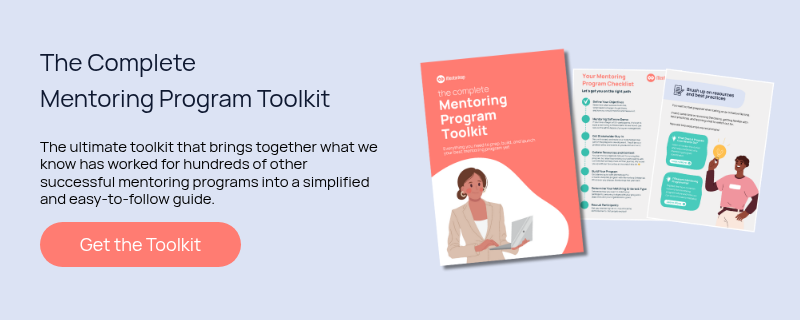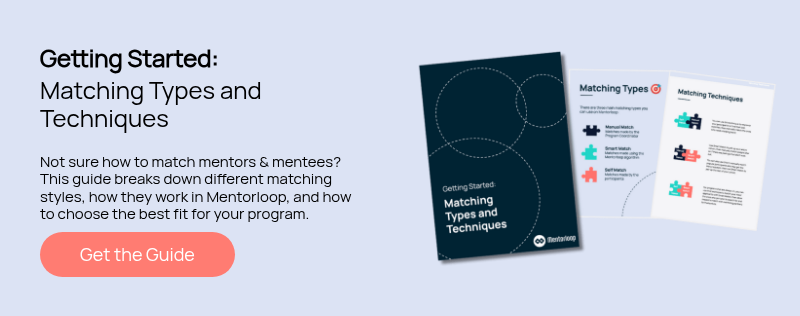The prospect of starting something new is daunting, especially in the case of mentoring programs where it has been proven that getting it wrong can be worse than not even trying. I know that sounds scary, but it doesn’t have to be. As with any program or project, preparation is key. And if you already know why some mentoring programs fail, you can take steps to avoid the same pitfalls.
There are 7 common reasons mentoring programs fail:
- The program doesn’t have a clear goal
- The program isn’t customised to the organisation’s needs
- The program has no buy-in or support from senior management
- Poor matching
- Lack of competence
- Low engagement
- Lack of feedback and incorrect measurement
We discuss them in more detail below and offer tips on how to avoid them.
1. The Program Doesn't Have a Clear Goal

This is an easy one, but also easily overlooked. With no goal, potential participants will have little idea what you’re asking them to sign up to and what to do once they’re in the program. For program coordinators, knowing what to measure to determine success will be extremely difficult.
Carve out your program’s goals during the planning stage. Why are you launching a mentoring program? Is it for retention, learning and development, knowledge sharing? What are you hoping your cohort will achieve? Do you want to see more cross-functional collaboration? Do you want to see more women of colour in management positions?
Determining what you want out of the program will help you design it to be as effective as it can be. It also helps your participants set their own goals to guide them through their mentoring journey.
2. The Program Isn’t Customised to the Organisation’s Needs

It might seem like a good idea to adapt the methods of another successful mentoring program. The problem with that is that every organisation is different. From the culture, size, demographics, etc. – there’s a lot of variables at play. Just because a certain type of program worked for one organisation or cohort, doesn’t necessarily mean it will work for another.
Once you’ve determined your program’s goals, you should then figure out how you’re going to get there. Consider the kind of organisation you’re in. What’s the culture like? Is your workforce predominantly young? Is your organisation very hierarchical? All of these things (and more) should inform what kind of program you build.
Quick exercise. Let’s use one goal – knowledge sharing – and see how the type of mentoring program needed can still vary depending on an organisation’s unique characteristics:
- If you are a large organisation with branches across different geographies and you want employees to learn from best practices across the organisation, remote peer mentoring is probably the way to go.
- For a growing company that needs to take advantage of technology for more efficiency but has many older employees who may be slightly behind in that department, reverse mentoring would probably work best.
- For getting high-potential employees ready to take on more senior roles, one-to-one mentoring is probably the winner here.
You get the point. Your mentoring program should be tailor-made for your organisation and what it needs at the time you’re running it.
3. The Program Has No Buy-in or Support from Senior Management

Any program needs support from management for it to succeed long-term. Mentoring programs fail with no support as they can get axed or be seen as just another to-do and a distraction from real work.
Having management support the program is so important – it gets employees interested and encourages participation. It also gives would-be participants people to look to for what joining a mentoring program can do for them. It also shows them that leaders care about their people’s progress.
When presenting the business case for your mentoring program to management, make sure to highlight, not just the benefits to the employees, but also the benefits to the organisation. Talk through, not just why it’s good to have a mentoring program, but why you need one. Find members of management who have benefitted from some form of mentoring before and see if they can be one of your program’s mentoring champions. This way, you don’t just get a ceremonial sign-off without real support.
4. Poor Matching

Mentoring is all about the relationship between mentors and mentees. If the matches aren’t great, the results aren’t going to be great. Program coordinators can make mistakes when matching mentees with mentors. Participants can make the same mistakes when matching themselves as well.
Everyone has bias, conscious or otherwise, and try as we may to keep them in check, these things do come through and show up in a few ways. Program coordinators might be able to make better matches for participants they know or have similarities with or are unable to make good matches for those who have completely different lived experiences to them. Participants in self-matching programs can just match with mentors or mentees with the same lived experience, or just with people they’re already familiar with. Sometimes, matches can also be made with no rhyme or reason – names in a hat, or just finding a mentor in a more senior position, or a mentee in the department a mentor has worked in before.
Obviously, this is detrimental to mentoring programs, especially ones aimed at working on Diversity & Inclusion in the first place. And even if D&I wasn’t the program’s goal, it’s good practice to match people who have different lived experiences anyway.
So there are 5 things to consider when matching your cohort:
- Skills – What does a mentee want to learn and who can help them with that?
- Goals – What does the mentee want to achieve and who is in the best position to provide valuable insight to help them with it?
- Proximity – Does the mentor/mentee in question prefer face-to-face meetings or are they comfortable with a remote mentoring relationship?
- Experience – Does the potential mentor have the experience required to give a mentee good insight and guidance? Does it have to be a senior member of the organisation, or would a peer mentor be more valuable?
- Inclusion – Are you making quality matches for people who would conventionally be left out of initiatives like mentoring programs? Are you matching people with different lived experiences?
Shared interests and common experiences may help build that initial connection, but it’s these 5 factors that influence how successful a match can be.
However, for the complete elimination of matching bias (and a big helping hand for the tons of admin work that comes with spreadsheet matching), we turn to technology. Mentoring software programs like Mentorloop allow program coordinators to use an algorithm to match their cohort. This eliminates any form of bias that comes with manual matching.
Even when participants self-match, mentoring software can still help. Having a place where mentors and mentees alike can browse profiles is a great tool to have. It gives them a place to see people’s areas of specialisation, their goals, interests, and a short bit about themselves, which all help participants gauge whether or not they would be a good match with potential mentoring partners.
5. Lack of Competence

This is another problem that’s easily overlooked. Sometimes, the job of creating a mentoring program is given to well-meaning employees who haven’t done it before and aren’t given the resources to learn how to do it well. Similarly, it is often assumed that all successful managers can be good mentors, or that good employees can be good mentees. Without previous experience in mentoring, would-be mentors and mentees don’t have a benchmark for how it’s supposed to be done right. And from there, it’s highly likely that these mentoring programs fail.
Inadequately prepared mentors, mentees, and program coordinators can give mentoring programs a bad name in the organisation and can work against the same objectives that the mentoring program was trying to address in the first place.
Everyone involved would benefit from a collection of resources to help them improve their knowledge and competence in areas that will make this experience productive and positive. This is why Mentorloop constantly updates our blog and resource library.
For program coordinators especially, it’s vital to be well-informed and confident that you can guide your cohort through their journey. Yes, program admin can be tedious and time-consuming, but learning how to support participants is key. Consider using software that gives a hand with admin efficiency and really get familiar with it. I know it seems obvious, but really getting to know what your software is capable of will make admin and reporting easier for you, allowing you to dedicate time to arming yourself with information to support participants and program success.
Mentors and mentees should also know the basics of what to expect from a mentoring relationship and how to get the most out of it. Sometimes mentoring relationships don’t work out because of different expectations or the lack of competence in the skills needed to be a good mentor or mentee. This is where program coordinators can guide participants by sharing resources that can guide them in their journey, as well as some inspiration to keep them going.
6. Low Engagement

When there’s not enough interest, mentoring programs fail. The same is true if the initial interest in the program fizzles out. Many programs have failed because not enough people signed up (we usually recommend a minimum of 100 people in a program) or those that did stop engaging somewhere along the way.
To build and maintain momentum in your mentoring program, marketing is key. It’s so important to have a plan in place to promote your program before launch as well as during the program duration. Those mentoring champions we mentioned earlier? Have them communicate with your cohort to evangelise about and reinforce the benefits of both joining a mentoring program and staying the course. Make use of your organisation’s intranet or newsletter, hold meetings with team leaders, ask for time to talk about the program at the general meeting or the All Hands – use any and all tools and opportunities that are available.
If you’re using mentoring software, it may have some tools to help you maintain mentoring momentum. Mentorloop, for example, guides your cohort through Milestones that encourage them to move forward in their mentoring relationship. Mentorloop’s Nudges also give participants supportive information at the right time during their mentoring journey.
And if you ever feel like you’ll be short on mentors for your second go-around with a mentoring program, guess what – your former mentees can be mentors!
For more tips on increasing mentoring program engagement, watch this video:
7. Lack of Feedback and Incorrect Measurement

No matter how well-informed and prepared you are when building your program, it won’t be perfect. So it’s important to be open to feedback from your cohort as they progress. One of the worst things you can do when it comes to measuring your program’s success is just doing it at the end. Even if you are open to feedback but only ask for it at the end, it leaves you with no room to course-correct. Measuring how your program is doing while it’s running is vital.
Remember to get in touch with your participants at different stages of the program. Find out how your cohort is doing after they get matched to find out if they’re happy after their initial meetings. Ask mentors if their mentees are proactive in scheduling meetings. Ask mentees if their mentors are showing interest in helping them reach their goals. Insight like this is vital in making sure your program becomes a success.
Pro Tip: Mentorloop helps you gather insights into your participants’ experience as they’re going through the program – not at the end. Mentorloop tells you when people aren’t engaging with their mentors/mentees, when people aren’t scheduling meetings or missing meetings, if someone has too many match requests to handle, and more. It gives you an easy way to keep track of everyone’s progress and experience so you’re not having to rely on individual feedback and allows you to easily get in touch with participants to check in and support them along the way.
Keen to learn more about how Mentorloop collects and analyzes feedback?
Using the wrong metric to measure your program’s success is also a common reason mentoring programs fail. Program coordinators can oftentimes try to measure the hours their participants spend on mentoring and while that can be done, especially if you have software that can measure that for you, it’s not ideal. In fact, it’s a terrible idea. Just as you don’t measure the quality of your personal relationships by the amount of time you spend together, you shouldn’t do it for mentoring relationships either.
So, what metrics should you use? At Mentorloop, we use a healthy mix of quantitative and qualitative data. You can have a ton of users on your platform every month, but their relationships might be mediocre. Supplementing this data with qualitative data from surveys allow you to have more insight into the numbers and understand what is actually happening in your program.
Learn more about how Mentorloop analyzes your data and turns them into actionable insights and shareable reports.
At the end of the day, whether mentoring programs fail or succeed really does rest on the shoulders of the program coordinator. And as daunting as that may sound, you can rest assured that there are ways to avoid failure and resources you can access to help you achieve success.
The rewards are going to be well worth the effort, we promise!
Ready to get your mentoring program started? Chat with one of our Mentoring Experts about how Mentorloop can help you build the best program for your organisation.



![[Webinar Kit] Building the Blueprint: Designing Your Best Mentoring Program Yet Learn how to design and build a mentoring program that serves your organization’s goals, engages participants, and delivers measurable outcomes.](https://no-cache.hubspot.com/cta/default/4058869/interactive-190169165857.png)







